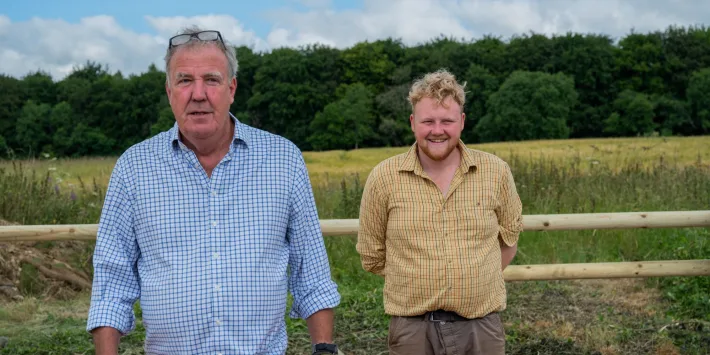Clarkson’s Farm viewers are fuming at the ‘shocking use of taxpayers’ money’ after watching season two.
The second season of the hit Amazon Prime TV show follows Jeremy Clarkson as he tries his hand at being a farmer.
The first season was an absolute smash and achieved a 100% rating on Rotten Tomatoes.
With Clarkson’s Farm Two now out, viewers have been happy to return to Diddly Squat Farm and have taken to social media to react to it.
However, they’ve noticed one thing and they aren’t too happy about it.
Watch the trailer for Clarkson’s Farm Season Two below…
Episode four starts off with Clarkson discovering that an artificial insemination project to get his cows pregnant has not worked.
Clarkson then finds out about a bovine tuberculosis outbreak that happened in the UK – which was caused by the badger population.
Veterinary expert Dilwyn Evans explains that while the disease can also be spread by deer and foxes, these animals can be slaughtered by farmers and landowners.
However, badgers have been protected by the law since 1992, in an effort to stop badger baiting.
This means that it is illegal to harm, kill, or interfere with badgers, with failure to comply with the law could lead to six months of imprisonment.
Related Article: Jeremy Clarkson Breaks Silence After ‘Vile’ Meghan Markle Rant Sparks Backlash
Related Article: Jeremy Clarkson Set To Be Axed From Amazon Prime Video
This has led to viewers taking to social media to discuss the fact that the issue has cost taxpayers so much money.
One person shares: “I started watching Clarkson’s Farm 2 last night.
“I was shocked that the taxpayer is paying over 150 million to compensate the bovine tuberculosis problem.”
Someone else adds: “All I’ve figured out from Clarkson’s Farm Two so far is that badgers are costing taxpayers over 100 million and costing farmers their livelihood.”
A third person comments: “Watching Clarkson’s Farm and it has raised a lot of issues from farmers losing their EU subsidies caused by Brexit and also badgers.
“It’s a proper dilemma. Kill the badgers to save the herd, or save the badgers but kill the herd if they catch TB from the badgers.”

Another viewer says: “Just watched the first four episodes of series 2 of Clarkson’s Farm. Genuinely laugh-out-loud funny.
“I’m sure there’s more to it but seems crazy that badgers are so protected given the havoc they apparently wreck.”
While someone else comments: “Watching Clarkson’s Farm is so frustrating. It demonstrates what nonsense this country is.
“Watching badgers spread TB and wipe out farmers because they were protected in the 80s to stop badger baiting which no longer exists is ridiculous. A country of pointless red tape.”
Related Article: Piers Morgan Accuses Sam Smith Of Being ‘Over-Thirsty For Attention’ In Brits Outfit
Related Article: Simon Cowell Concerns Fans With Appearance As They ‘Don’t Recognise Him’
Viewers are also taking to social media to call out West Oxfordshire District Council for their attitudes and behaviours towards Clarkson’s proposals.
One of the storylines that are prominent throughout the season is the former Top Gear host’s idea to turn an old barn into a restaurant on his farm.
He intended to serve local produce to customers, as a way to make a profit from the stuff that he grows on his farm.
All episodes of Clarkson’s Farm Two are available to watch on Amazon Prime.
Watch our Video of the Day below…
Do you have a story for us? If so, email us at [email protected]. All contact will be treated in confidence.





